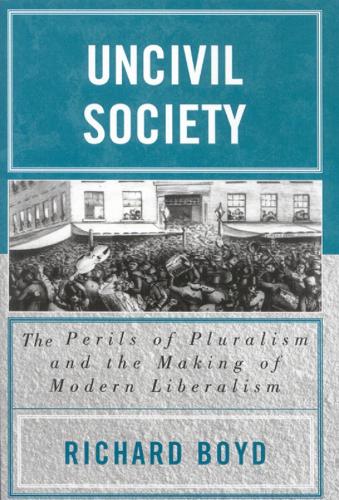
Uncivil Society: The Perils of Pluralism and the Making of Modern Liberalism
(Paperback)
Publishing Details
Uncivil Society: The Perils of Pluralism and the Making of Modern Liberalism
By (Author) Richard Boyd
Bloomsbury Publishing PLC
Lexington Books
18th August 2004
United States
Classifications
General
Non Fiction
Constitution: government and the state
320.513
Physical Properties
Paperback
332
Width 175mm, Height 228mm, Spine 28mm
549g
Description
Civil society is one of the most hotly debated topics in contemporary political theory. These debates often assume that a vibrant associational life between individual and state is essential for maintaining liberal democratic institutions. In Uncivil Society, Richard Boyd argues-through a careful reading of such seminal figures as Hobbes, Locke, Burke, Mill, Tocqueville, and Oakeshott-that contemporary theorists have not only tended to ignore the question of which sorts of groups ought to count as civil society but they have also unduly discounted the ambivalence of violent and illiberal groups in a liberal democracy. Boyd seeks to correct this conceptual confusion by offering us a better moral taxonomy of the virtue of civility.
Reviews
In his book, Richard Boyd offers a thoughtful reappraisal of the relation between the idea of civil society and the tradition of liberal political thought. He questions the view held by many contemporary political theorists that the development of civil society, understood as the realm of what Tocqueville called "voluntary associations" mediating between the individual and the state, is a necessary condition for the maintenance of liberal democracy. Against this position, Boyd argues that an earlier tradition of liberal thought was justifiably suspicious of the potential for subpolitical social groupsespecially, but not limited to, intolerant religious sectsto undermine rather than support liberal institutions. In a series of well-argued chapters, he traces the trajectory of the connected ideas of civil society and social pluralism from initial suspicion to perhaps uncritical acceptance. * Perspectives on Politics *
Richard Boyd has written an ambitious, intelligent, insightful, and challenging book . . . anyone interested in the history of liberalism, in the current debates over the lack of community, in the status or location of civil society will be both challenged and enlightened. -- Christopher J. Berry, University of Glasgow
Author Bio
Richard Boyd is Assistant Professor of Political Science at The University of Wisconsin-Madison.
